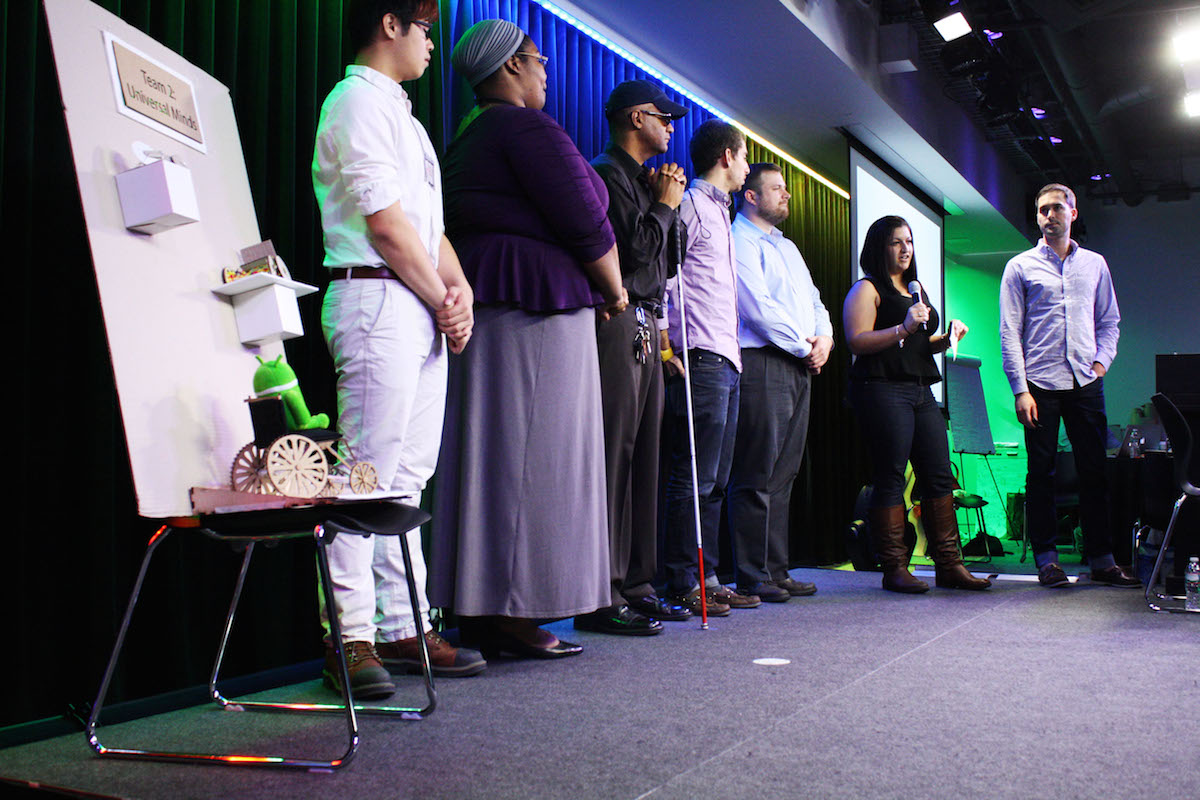For a day-and-a-half at D.C.’s second Enabled by Design-athon, more than 70 people came together with one goal: to make products with accessibility at the forefront of the creation process.
Designers, technologists, engineers, caregivers, students and people with disabilities signed up to mentor or contribute to the event. Placed in ten teams with local strangers and others from as far as Ann Arbor, Mich., the teams were expected to think of an idea to assist people with disabilities and build a prototype of it in 36 hours.
Organized by United Cerebral Palsy Life Labs, Enabled by Design-athons began in London in 2012 and traveled to Sydney earlier this year. UCP’s has hopes it will become a traveling troupe of universal design and head to Chicago next.

Participants had 36 hours to create a universally-designed prototype. (Photo by Ashley Nguyen)
“We share an important goal,” Adrienne Biddings, policy counsel for Google, said at the opening night of the event. “Accessibility and technology for all individuals. Tools should be accessible, useable and useful. [They] should make your life a little bit easier.”
With this objective in mind, the teams went to work at Google’s D.C. offices. The results included everything from an all-terrain wheelchair to an app that allows commuter information to be delivered in real time to people with special needs.
Below, Technical.ly DC fills you in on the winning teams:
Simplify app, Judge’s Choice
The team Stars at War spent about six minutes of their planning time watching a YouTube video called “Autism and Me.”
“Autistic people take things literally, and normal guys say some really weird things,” an autistic male named Rory Hoy says in the video. “How about, ‘It’s raining cats and dogs,’” Hoy says as he looks frantically around. “Wait a minute, we don’t see cats and dogs!”
Since people with autism might think the phrase “made the teacher mad as a wet hen,” means the teacher is drenched in water, Stars at War decided to build an application to translate idioms. Visualized as a Chrome extension, every idiom on a page would have a star next to it, and users could simply highlight the phrase to see a definition of the idiom in context.
The tool would also be similar to Wikipedia — with a catch. Others could submit additional translations, but they’d need to be approved. Non-English speakers searching for a piece of cake when someone tells them it’s an easy task might also find the tool useful.
“We’re talking about language, so this goes beyond people who speak English,” said team member David MacPherson, a Georgia Tech student. “Educators are the first ones we want to reach out to.”
Relatch, Winning Prototype
After talking with a woman who has cerebral palsy about her day, the team narrowed in on one problem everyone deals with: broken bathroom stall doors.
“We asked her, ‘What’s frustrating about your day?’” explained Mallory Anderson, a human computer interaction graduate student at the University of Michigan. “She said sometimes it’s the anxiety of being in the bathroom and afraid someone’s going to barge in on you.”
So the team prototyped a bathroom stall lock anyone can carry in their purse.
Shaped like two kites conjoined, the group used 3D printers brought in by sponsor PCS Engineering to print various versions of the lock before deciding on the final design. They also spent some quality time in Google’s bathrooms testing out each option.
User testing 2nd 3D- printed prototype at #designdc14. pic.twitter.com/1TEcj5phlj
— Karen Hold (@KarenHold) November 6, 2014
//platform.twitter.com/widgets.jsThe portable lock’s only real-market competitor is called Stall Stopper, and it requires the user to reach up to the top of the stall or down to the bottom. “Relatch is more portable and has a flat design,” Anderson said. “It’s universally designed because we considered different issues.”
Dubbing their project “personal public restroom technology,” the group said they could make the lock’s design open source so anyone with access to a 3D printer could have one for 60 cents or less.
WeAreAble, People’s Choice Award
Armed with several interior and industrial designers, an engineer and an occupational therapist, WeAreAble won over judges and fellow competitors with their wearable bracelets that allow people to grip and grab the impossible.
Clarice Torrey, a pediatric occupational therapist, told the judges about daily struggles she sees from people who have hemiplegia. Zipping up a coat? How can the person grasp the fabric to hold it still? Opening a ketchup packet? Guess that person will have to use their teeth and fully-functioning hand. (Hemiplegia partially paralyzes a side of the body, which makes dexterity difficult.)
But with a wearable bracelet with a clip attached to it, the person can grab onto anything from their iPhone to a fork.
Amazing presentations going on. Check out this neat logo! #designdc14 pic.twitter.com/1ZuO4cwMjM
— Elaine Mau (@elaineymau) November 7, 2014
//platform.twitter.com/widgets.js

WeAreAble shows off their wearable grip bracelet, which won the People’s Choice Award at D.C.’s Enabled by Design-athon. (Photo by Ashley Nguyen)
Join the conversation!
Find news, events, jobs and people who share your interests on Technical.ly's open community Slack

DC daily roundup: Appian's new AI tools; Foxtrot stores abruptly shutter; Sublime Security raises $20M

DC daily roundup: Startup founders offer praise; Howard U breaks application record; NavalX gets new director

DC daily roundup: Washington Post's AI collab; a greentech glossary; Halcyon's debut Climate Fellowship cohort

